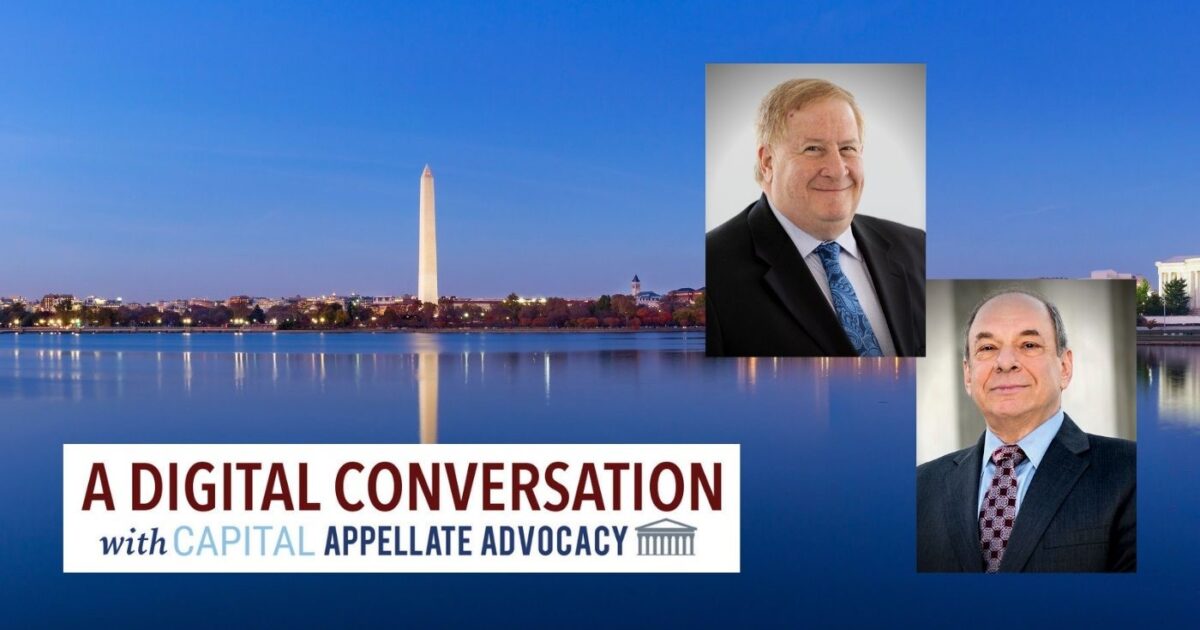
Alan Chvotkin’s extraordinary knowledge of federal government contracting ranges from broad policy issues affecting the government technology and services industry to the minutiae of federal acquisition regulations. As Executive Vice President and Counsel at the Professional Services Council (PSC), he oversees that organization’s legislative and regulatory policy activities. Prior to joining PSC in 2001, Alan held senior positions at AT&T Government Services and Sundstrand Corporation. Earlier in his career, Alan served the United States Senate as a professional staff member for the Government Affairs, Budget, Small Business, and Armed Services Committees. In addition to his law degree, Alan holds a master’s degree in public administration, and an undergraduate degree in pollical science, all from American University.
Alan’s organization, PSC, is the widely respected “Voice of the Government Services Industry.” Its more than 400 member companies and their hundreds of thousands of employees provide federal departments and agencies with a multitude of services, including information technology, engineering, logistics, facilities management, operations and maintenance, consulting, international development, scientific, social, and environmental services, both domestically and overseas.
I have had the privilege of working with Alan on several amicus curiae (friend-of-the-court) briefs filed on behalf of PSC in the Supreme Court and other appellate courts in cases involving legal issues important to the association and its members. Alan has such a wealth of expertise and experience on government procurement, I was delighted to engage him in the following digital conversation:
Larry Ebner: Alan, over the years you have tackled challenging procurement-related legislative, regulatory, and judicial issues from at least three perspectives—as a Senate committee staff member, working for major government contractors and, for the past 19 years, as a trade association executive and counsel. What differences have you observed regarding how government and industry stakeholders approach such issues?
Alan Chvotkin:
While a Hill staffer, many of the procurement policy issues I worked on arose from constituent input, from our oversight activities, or from requests from the federal agencies. There were long periods of public and private review and negotiation. But once action was taken, primarily through oversight recommendations or legislation, there was an expectation of instant agency implementation and rapid change.
While in industry, those acquisition policy pronouncements often required detailed internal implementation evaluations before changes were made; we often had only one chance to get it right. Neither the Hill nor the agencies appreciated (then or now) the challenges and decision-making processes companies go through to bid on new federal procurement opportunities, to make company-wide policy changes, or to ensure regulatory compliance.
From the association perspective, our job is to be an advocate for a diversified, growing, and changing industry. I draw on my prior experiences and extensive engagement with our member companies to understand the effect of proposed governmental action on our members and industry. Often, my advocacy is to stop “bad” ideas from being adopted. But unlike my responsibilities in industry, at the association we don’t have any responsibility for implementing those acquisition policy changes. However, in addition to being an advocacy organization, our non-profit association is an on-going business that requires our compliance with many of the same business laws and regulations as our members.
Larry Ebner: What are your current key legislative or regulatory objectives on behalf of the government technology and services industry?
Alan Chvotkin:
First, we want to continue raising the visibility of the role of contractors in helping federal agencies successfully execute their missions. Whether it is ensuring the capabilities of agency information technology or having personnel deployed outside the U.S. in support of the U.S.’s military or foreign policy objectives, our members support every federal agency and many of the Nation’s most challenging missions.
Second, we focus on the government-business relationship in federal procurement. Here our goal is to make the government a smarter buyer and our members a better provider of goods, services and solutions. That over-arching mission covers an ever-changing list of items.
Third, we seek to facilitate agency access to emerging industry technologies and capabilities.
Fourth, we seek to educate our members, and the industry, on emerging federal acquisition policy issues that impact how companies are able to compete for and perform government contracts.
Larry Ebner: Often you and I discuss litigation trends and challenges that PSC members face. What are your thoughts about the steady stream of False Claims Act suits being filed against technology and services contractors by private “qui tam relators” and their contingency-fee lawyers? Do you have any specific advice on what contractors can do in advance to help protect or defend against such suits?
Alan Chvotkin:
We’ve been engaged in the False Claims issues from the legislative, regulatory and litigation fronts for a long time. The best defense against False Claims Act suits is a robust and visible company compliance program, especially in view of the Supreme Court’s recent endorsement of the “implied certification of contractual and regulatory compliance” theory of False Claims Act liability. Over the past several years, however, the number of successful False Claims Act cases based on procurement compliance has dropped because of Department of Justice declinations and important court decisions on pleadings and the definition of “knowledge.” Even so, the risk to companies, and the time and expenses that are incurred based on initial allegations, is enormous. When considering litigation, our association tends to consider filing amicus briefs only at the appellate stage, with a goal of our amicus briefs bringing to a court’s attention an industry-wide, not just a litigant’s, perspective on the issue. As an association, we can take a broader and longer view of issues raised in litigation. And our approach is not limited to just FCA cases.
Larry Ebner: What about personal injury suits filed in the U.S. courts against services contractors that assist the federal government with overseas combat or natural disaster missions? Is there an industry-wide legislative, regulatory, and/or judicial role that PSC can play in helping to mitigate such litigation?
Alan Chvotkin:
There is certainly an association role here and one that we have been involved with for over a decade. With the Supreme Court’s Feres doctrine, which prohibits military service members or their beneficiaries from suing the Federal government, plaintiffs (and their lawyers) look to the next deepest pockets – and that’s often the contractors. Thus, we have filed amicus briefs in suits to address the contours of the government contractor defense, additional federal question issues such as the political question doctrine and combatant activities preemption, and also derivative sovereign immunity. We have also been successful pursuing both legislative and regulatory changes. But more significantly, our association has been most successful when we have brought the government and our members together to discuss common issues and engage jointly in productive actions.
Larry Ebner: Let’s change the subject. How can artificial intelligence— “AI”—be expected to affect the federal procurement process and/or the delivery of technology and other services to federal departments and agencies?
Alan Chvotkin:
AI is an enabler. It is being used by federal agencies to replace rote tasks performed by individuals and to draw business intelligence for decision-making from unstructured government data. Contractors are using AI in their own operations in addition to providing guidance and solutions to federal agencies. AI use is growing but that brings with it questions about how the Federal government can best acquire such tools and what it means to use AI “ethically.” PSC is involved on these and other policy questions.
Larry Ebner: Based on your many years of trade association leadership and experience, what are the most effective ways that an organization like PSC can interact on behalf of its members with each branch of government—Congress, the Executive branch, and the courts?
Alan Chvotkin:
Notwithstanding the uniqueness of each of the branches of the Federal government, we approach our interactions on behalf of our membership focused on three tenets. The first is to be a credible and respected advocate for our industry and our views, and we’ve been successful with that for the two decades I’ve been at PSC. Second is to educate our members, the agencies, the Hill, and the courts about the valuable role of contractors and the impact of their policy issues and actions on our membership and industry. Third, we try to facilitate engagement for our members with policy makers in the agencies and on the Hill. We then use the tools and opportunities available to us in each branch of government to engage, whether it is testifying before committees of Congress, filing written comments on agency proposed regulations, or filing amicus briefs at the various Federal Courts, including the Supreme Court. However, when filing amicus briefs, it is essential to work with and through experienced appellate counsel, such as you.
Larry Ebner: One final question: What can individual companies and their representatives do to get the most value out of their PSC membership?
Alan Chvotkin:
Each association is organized differently and has its own engagement model. For us, we are fortunate to have the extensive involvement of the senior executives of our member companies, along with deep touches with senior business leaders and company subject- matter experts. This allows us to develop key understandings of the companies’ priorities and the impact of government actions on our members, which guides our association’s advocacy efforts. That engagement relationship, coupled with our regular communications to our members about activities and opportunities and our external communications to media on industry topics, provides the value to the company of their PSC membership.
Larry Ebner: Thank you, Alan. How can readers contact you directly?
Alan Chvotkin:
Larry, thank you for this opportunity. I welcome hearing from readers. Contact me at chvotkin@pscouncil.org and check out our website at www.pscouncil.org.

